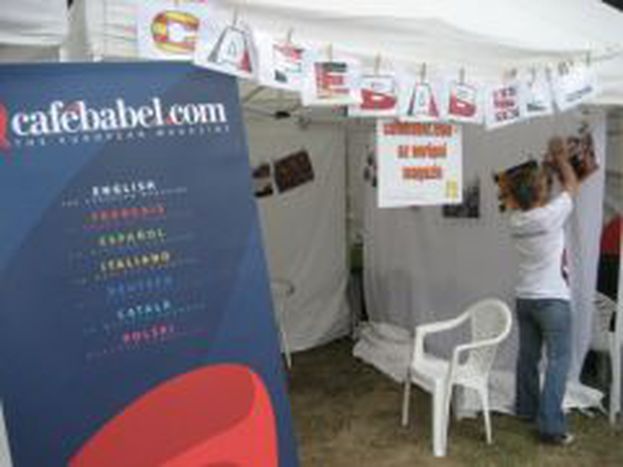
Sziget Festival without Cafebabel? Not in 2007!
Published on
Translated by Lóránt Havas
The Budapest team of cafebabel.com played an active role again for the second time on one of Europe’s most wanted cultural fora, Budapest’s Sziget Festival. The team organised programmes on 11 and 12 August in the Civil Village drawing the attention of many Sziget-dwellers from all around the world. Four million.
That is the number of visitors the popular festival counts from the beginnings, fifteen years ago, that is. Like in the previous 14 years, the 15th Sziget also hosted a bunch of big shots like Pink, the Chemical Brothers, Franz Ferdinand, Nine Inch Nails, the Faithless, Sinéad O’Connor and many others. Despite the changing weather dotted with rainshowers and the consequent mud wrestling, everybody seemed to enjoy her/his favourite music during the eight days of the festival, no matter if it was rock, pop, classic or world music, reggae, blues, electro, punk, jazz or whatever.  Two new Guinness records were also born: 14,902 people (or 7,451 couples) were kissing at the same time on the main square on Saturday and the Guinness stage saw the longest ever concert in the history of music, starting off on 7th August to break the actual world record eight days later, at 9 am on 15th August. There were approximately 70 NGOs represented in the Civil Village, offering a wide range of cultural and less cultural programmes.
Two new Guinness records were also born: 14,902 people (or 7,451 couples) were kissing at the same time on the main square on Saturday and the Guinness stage saw the longest ever concert in the history of music, starting off on 7th August to break the actual world record eight days later, at 9 am on 15th August. There were approximately 70 NGOs represented in the Civil Village, offering a wide range of cultural and less cultural programmes.
 After last year’s success, our team got invited again and prepared with colourful events to continue the cafebabel story on the Sziget. Voilà!
After last year’s success, our team got invited again and prepared with colourful events to continue the cafebabel story on the Sziget. Voilà!
Saturday, August 11, 2007
BRUNCH WITH ÁGI SZALÓKI
 The first cafebabel event took place on Saturday morning on the Civil Playground. It was a chat-interview with the singer Szalóki Ági, moderated by Bori, a member of our team. It quickly turned out that, though she sings it a lot, Ági is not a classical folk singer. Her music combines Hungarian, Transylvanian, Gypsy and other types of folk music with Fado, jazz, often with children’s music and many more.
The first cafebabel event took place on Saturday morning on the Civil Playground. It was a chat-interview with the singer Szalóki Ági, moderated by Bori, a member of our team. It quickly turned out that, though she sings it a lot, Ági is not a classical folk singer. Her music combines Hungarian, Transylvanian, Gypsy and other types of folk music with Fado, jazz, often with children’s music and many more. 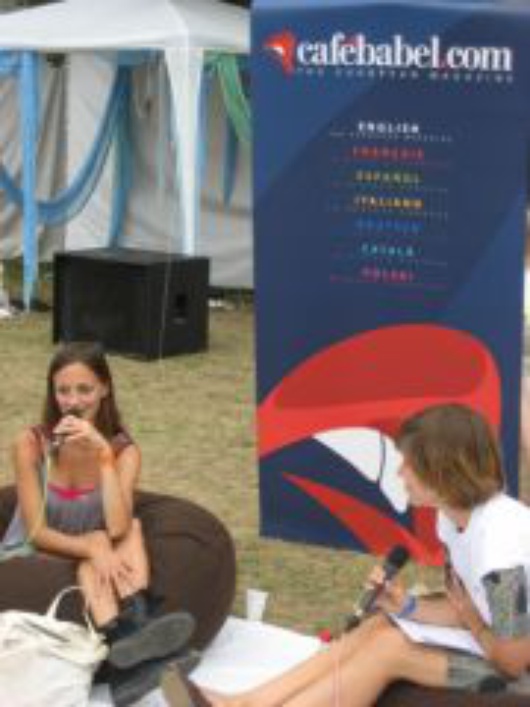 That is how she already performed with many different bands, such as the Ökrös orchestra (folk), the Besh o Drom (Gypsy music, she became a well-known singer with them, by the way), Makám (folk), the Balázs Elemér Group (jazz), Szakcsi Lakatos Béla (jazz), Palya Bea (folk singer also well known in France) or with Herczku Ágnes (folk singer). She likes to sing best for children. Not only because they are enthusiastic, but because they are really open to everything, including Gypsy culture. These encounters with the youngest generation always fill her up with energy, she claims. Ági has the Gypsy culture in her veins as her mother is of Roma origin. It was her mother who first introduced Ági to the world of Gypsy folk music which had an effect on her from the first moment she got to listen to it.
Nevertheless, Ági is not only the honorary ambassador of Gypsy music, she also supports many civil initiatives. She is a well known local patriot and protector of the cultural heritage and the natural environment. Besides, she also campaigns for fair trade, and was, therefore, very happy when cafebabel treated her to some fair trade coffee with the support of the Be Fair! Foundation. When speaking about the accession to the European Union, Ági generally welcomes the move, and hopes that this would encourage Hungarians to think even more European, especially when it comes to the protection of environment.
That is how she already performed with many different bands, such as the Ökrös orchestra (folk), the Besh o Drom (Gypsy music, she became a well-known singer with them, by the way), Makám (folk), the Balázs Elemér Group (jazz), Szakcsi Lakatos Béla (jazz), Palya Bea (folk singer also well known in France) or with Herczku Ágnes (folk singer). She likes to sing best for children. Not only because they are enthusiastic, but because they are really open to everything, including Gypsy culture. These encounters with the youngest generation always fill her up with energy, she claims. Ági has the Gypsy culture in her veins as her mother is of Roma origin. It was her mother who first introduced Ági to the world of Gypsy folk music which had an effect on her from the first moment she got to listen to it.
Nevertheless, Ági is not only the honorary ambassador of Gypsy music, she also supports many civil initiatives. She is a well known local patriot and protector of the cultural heritage and the natural environment. Besides, she also campaigns for fair trade, and was, therefore, very happy when cafebabel treated her to some fair trade coffee with the support of the Be Fair! Foundation. When speaking about the accession to the European Union, Ági generally welcomes the move, and hopes that this would encourage Hungarians to think even more European, especially when it comes to the protection of environment.
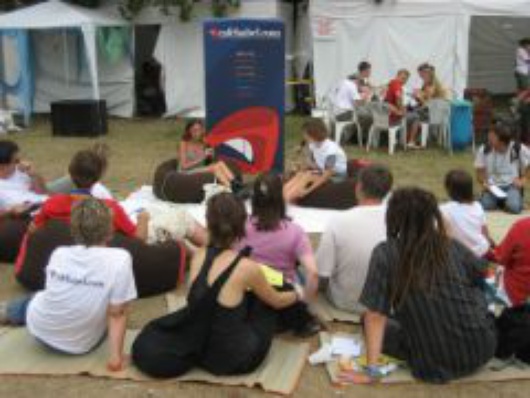 Her aim in music is to get closer to people who are open to her music and get her message through to them. As she very much likes experimenting and would like to stay open to the different musical streams, she told us that she didn’t want to stick to any precise style. This might be great as an artist, however, managing someone without a clear profile is not so easy. For the moment she can live with the situation. She is, as she put it, like a “laboda”, a plant that has few needs and can survive winter and summertime as well.
Her aim in music is to get closer to people who are open to her music and get her message through to them. As she very much likes experimenting and would like to stay open to the different musical streams, she told us that she didn’t want to stick to any precise style. This might be great as an artist, however, managing someone without a clear profile is not so easy. For the moment she can live with the situation. She is, as she put it, like a “laboda”, a plant that has few needs and can survive winter and summertime as well.
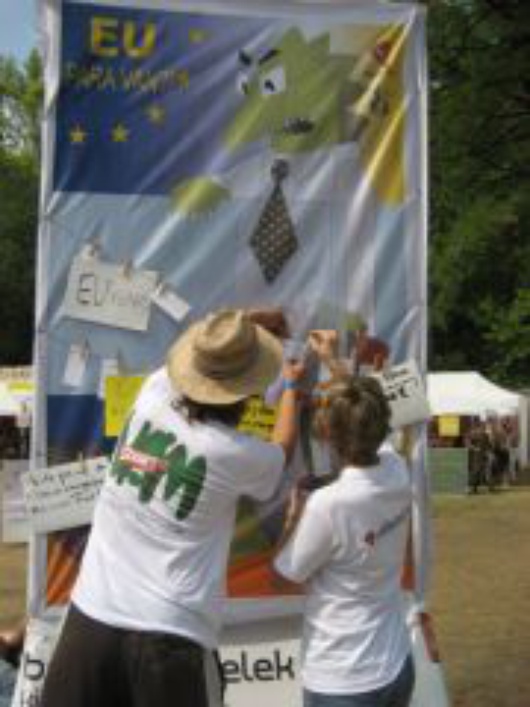 After the pleasant brunch with Ági, we set up our already well-known giant board symbolising the EU monster, attracting a fair number of visitors again, who got to know cafebabel.com better and could also talk about their fears connected to the EU with the members of our team. In exchange of the opinions and comments put on the EU monster, we gave the Sziget-dwellers our very practical and user friendly invention, the Sziget dictionary. The dictionary , just like a year ago, became a huge success with its funny and catchy phrases translated into eight languages making socialising a lot easier for the inhabitants of the Sziget.
After the pleasant brunch with Ági, we set up our already well-known giant board symbolising the EU monster, attracting a fair number of visitors again, who got to know cafebabel.com better and could also talk about their fears connected to the EU with the members of our team. In exchange of the opinions and comments put on the EU monster, we gave the Sziget-dwellers our very practical and user friendly invention, the Sziget dictionary. The dictionary , just like a year ago, became a huge success with its funny and catchy phrases translated into eight languages making socialising a lot easier for the inhabitants of the Sziget.
Topping up our fabulous Saturday, the team went to the World Music Stage to see our following day guests, the Pannonia Allstars Ska Orchestra (PASO) in concert. After the frenetic show the guys put on we could hardly wait the next morning (well, early afternoon) to have a brunch with at least some of them.
Sunday, August 12, 2007
BRUNCH WITH PASO
Two members of the PASO, the singer Tóth Kristóf A.K.A. “Krsa” and Benkő Dávid (keyboards) were our tired guests for the brunch on Sunday. While Verus asked the questions and moderated the discussion, the tired audience was shaken up by the zippy sounds of the PASO, some fair trade coffee and the freshly baked patisserie of the Kolosy square bakery. Our plan to involve a lot of people was quite successful as by the end of the brunch one could not find a place to sit before the stage.
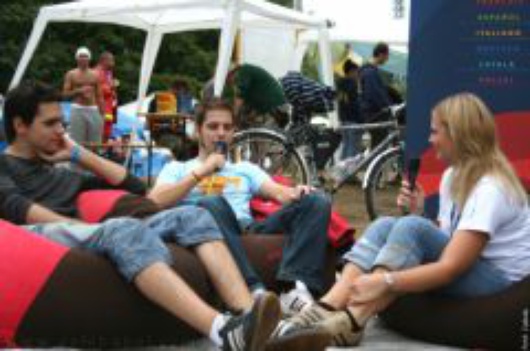 The PASO is quite used to the crowd as their concerts also attract many people. They are well known participants on festivals, where they usually play for thousands, but they give club-concerts as well. Their popularity is not surprising if we know that they are one of the leading ska groups in Hungary. The band (or better to say the orchestra) has ten members, all talented young musicians coming from different underground groups who play together since 2003. They released a number of albums, the last in the autumn 2007. Their own style matured and became really peculiar during the years. When one of their early songs was played, they both started laughing and told that they wouldn’t play this kind of music nowadays. Yet their style is still changing, influenced by the members’ individual taste and ambitions. The combination of these musical tastes makes up the original PASO sound, a music that is somewhere between dub, reggae and ska.
The PASO is quite used to the crowd as their concerts also attract many people. They are well known participants on festivals, where they usually play for thousands, but they give club-concerts as well. Their popularity is not surprising if we know that they are one of the leading ska groups in Hungary. The band (or better to say the orchestra) has ten members, all talented young musicians coming from different underground groups who play together since 2003. They released a number of albums, the last in the autumn 2007. Their own style matured and became really peculiar during the years. When one of their early songs was played, they both started laughing and told that they wouldn’t play this kind of music nowadays. Yet their style is still changing, influenced by the members’ individual taste and ambitions. The combination of these musical tastes makes up the original PASO sound, a music that is somewhere between dub, reggae and ska.
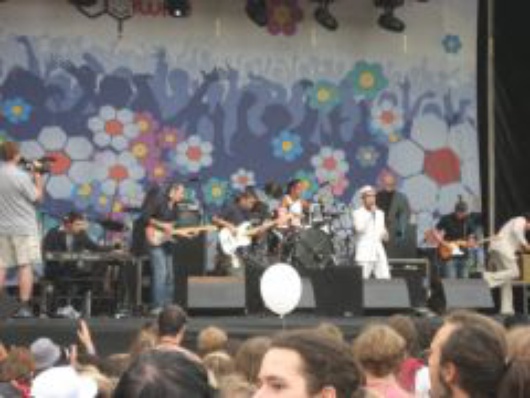 Krsa and Dávid told us stories about their concerts in other European countries. It is really important for them to be able to show their music to many people and become well known with the help of it. The sky is the limit – as they said. Even though they don’t have a manager, PASO is already a known name in the international ska community. However, music for them is “only” a hobby, most of them have a university degree (Krsa has a degree in economics for example). Having seen them on the stage it seems unnecessary to stress that their motivation is not mone, they do it for the fun of it and enjoy playing their music until the very last sound.
Krsa and Dávid told us stories about their concerts in other European countries. It is really important for them to be able to show their music to many people and become well known with the help of it. The sky is the limit – as they said. Even though they don’t have a manager, PASO is already a known name in the international ska community. However, music for them is “only” a hobby, most of them have a university degree (Krsa has a degree in economics for example). Having seen them on the stage it seems unnecessary to stress that their motivation is not mone, they do it for the fun of it and enjoy playing their music until the very last sound.
What does Europe mean for the PASO? Dávid explained that they think it is through the music that the different people can really communicate and that it is music that unites them. It does not matter that you are playing music with Hungarian folk elements in the Netherlands, once the crowd grasps the rhythm you immediately feel that you are speaking the same language and the party is just as good as it would have been in Hungary. Most of their songs are written in English in order to help people understand them better and to pave the way towards world fame. Well, what can we say? Go PASO go! These guys deserve it a lot.
DISCUSSION ON CLIMATE CHANGE
Later on that day a more “serious” programme was on stake: a discussion on climate change, animated by the German language editor of cafebabel Katharina Kloss who arrived directly from Paris for this programme. This was her first time in Hungary. We also invited Maria Khovanskaia (Regional Environment Centre), Hasznos Erika (Hungarian Ministry of Environment and Water Protection) and Rohonyi Péter, member of Greenpeace to join our discussion. The debate was in English and attracted many Sziget-dwellers from all around the globe, providing for a very lively discussion between the audience and our guest experts.
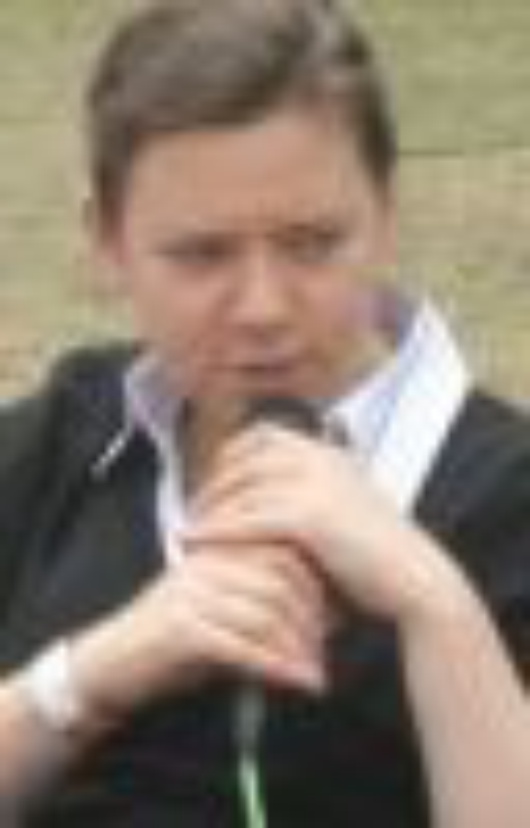 Maria Khovanskia started the discussion with introducing the audience to the scientific concept of climate change. This was followed by the clash of the views of the Ministry and Greenpeace, yet they were of the same opinion in many matters, for example they both pointed out the dangers of the negative climatic changes took place recently and advocated that a more responsible and environment-friendly approach is desirable on the level of individuals and of the society as well.
Maria Khovanskia started the discussion with introducing the audience to the scientific concept of climate change. This was followed by the clash of the views of the Ministry and Greenpeace, yet they were of the same opinion in many matters, for example they both pointed out the dangers of the negative climatic changes took place recently and advocated that a more responsible and environment-friendly approach is desirable on the level of individuals and of the society as well.
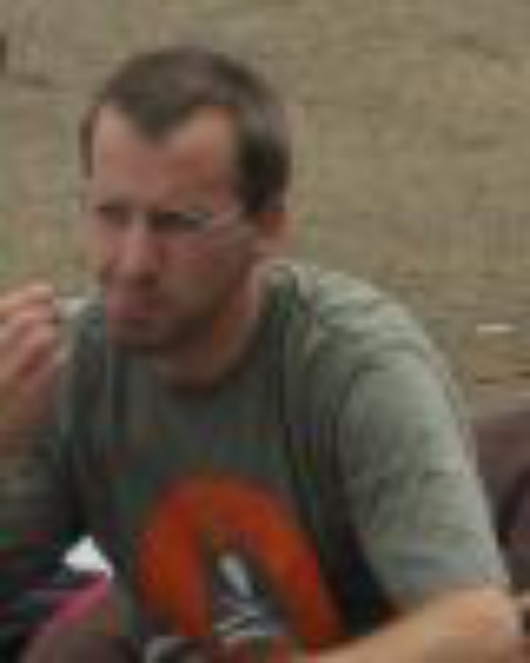 Nevertheless, Mr. Rohonyi blamed the government for its bureucratic attitude and that things take always ages to be done in the ministry and environmental investments are still at a low level, he added. He did not deny the results already achieved, yet he stressed that they are not at all fulfilling and claimed that the government was responsible for the lack of political coherence in the field of environment and for the inapt communication as well. He called our attention to the Greenpeace analysis on the effects of climatic change to be issued in the future containing the concrete tasks to be executed for the years to come.
Nevertheless, Mr. Rohonyi blamed the government for its bureucratic attitude and that things take always ages to be done in the ministry and environmental investments are still at a low level, he added. He did not deny the results already achieved, yet he stressed that they are not at all fulfilling and claimed that the government was responsible for the lack of political coherence in the field of environment and for the inapt communication as well. He called our attention to the Greenpeace analysis on the effects of climatic change to be issued in the future containing the concrete tasks to be executed for the years to come.
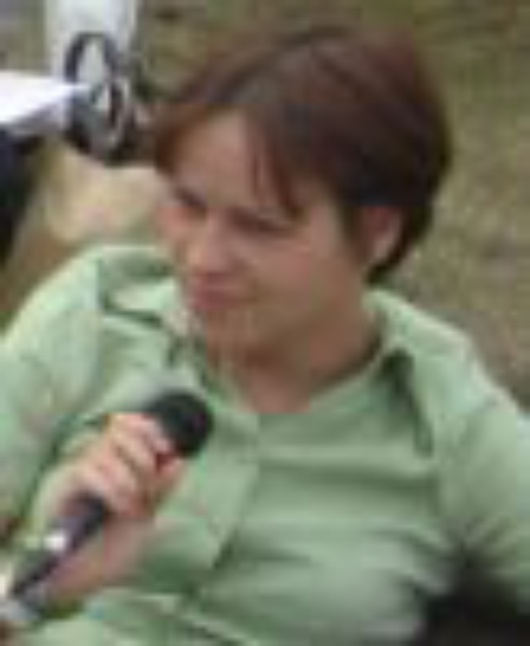 In her reaction Ms. Hasznos outlined the strategy of the ministry and talked about a possible „road show” to be organised by them on the topic of climate change. She pointed out that despite the criticism coming from the civil society, only a limited number of companies care to answer and to provide data for the calls of the ministry and that it does not help their job. She also reminded us to the “Climate Agreement” adopted at EU level, intended to cut the emission of carbon-dioxide and other toxic substances by 10-15% in the next 15 years. This instrument seems to have achieved a globally shared responsibility, contrary to the famous Kyoto Protocol that has not yet been signed by some important global actors.
In her reaction Ms. Hasznos outlined the strategy of the ministry and talked about a possible „road show” to be organised by them on the topic of climate change. She pointed out that despite the criticism coming from the civil society, only a limited number of companies care to answer and to provide data for the calls of the ministry and that it does not help their job. She also reminded us to the “Climate Agreement” adopted at EU level, intended to cut the emission of carbon-dioxide and other toxic substances by 10-15% in the next 15 years. This instrument seems to have achieved a globally shared responsibility, contrary to the famous Kyoto Protocol that has not yet been signed by some important global actors.
Mr. Rohony, while fully endorsing the EU initiatives, expressed his doubts about the future impementation of the EU regulation. He underlined again that we have no time to waste, steps need to be taken soon following a strict strategy altering our lifestyles in every possibly ways.
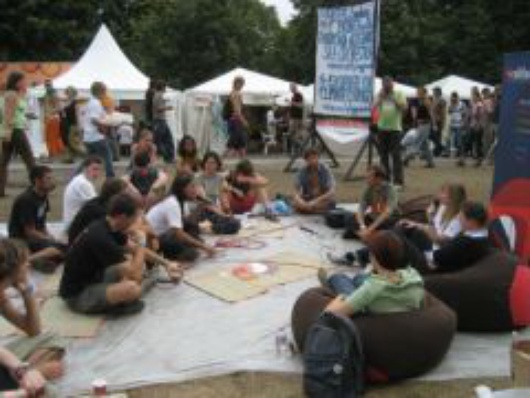 The participants agreed that the emission-trade is not a good solution to the environmental problems, it only delays the emergence of the problems a bit. During the discussion light was shed on the possibility to use nuclear power on a broader scale, on the responsibility of the individuals, the importance of the promotion of positive attitude and of the powers of the nature (wind, sun, biomass, etc.). There was a small confrontation between the partisans of nuclear power and the representative of Greenpeace, but at the end they all agreed that nuclear power can be seen as an alternative substitutive element, only its place on the list is a matter of choice.
The participants agreed that the emission-trade is not a good solution to the environmental problems, it only delays the emergence of the problems a bit. During the discussion light was shed on the possibility to use nuclear power on a broader scale, on the responsibility of the individuals, the importance of the promotion of positive attitude and of the powers of the nature (wind, sun, biomass, etc.). There was a small confrontation between the partisans of nuclear power and the representative of Greenpeace, but at the end they all agreed that nuclear power can be seen as an alternative substitutive element, only its place on the list is a matter of choice.
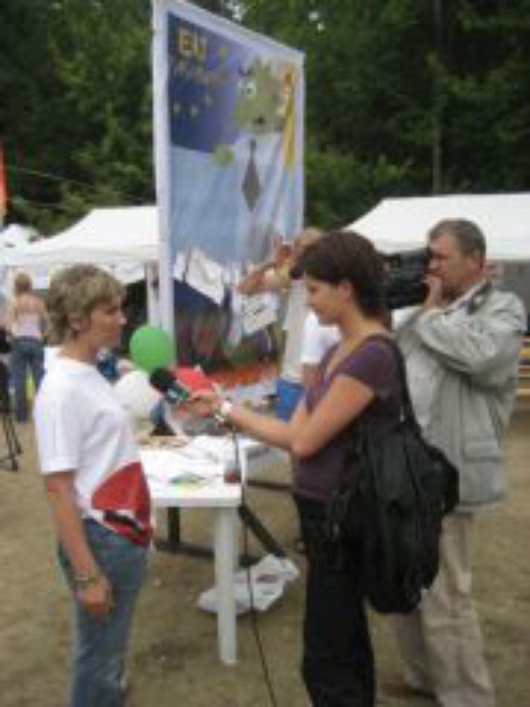 The cafebabel team had quite a good media coverage. We gave two TV interviews: Eszter to a cable TV channel – Echo TV, and Linda to the Hungarian Television about the magazine and our programmes organised on Sziget.
The cafebabel team had quite a good media coverage. We gave two TV interviews: Eszter to a cable TV channel – Echo TV, and Linda to the Hungarian Television about the magazine and our programmes organised on Sziget.
Our presence on the Sziget Festival proved to be a success again, we got our message through to many people from many coutries, making cafebabel even better known worldwide and we enjoyed ourselves a lot! See you next time on Sziget!



